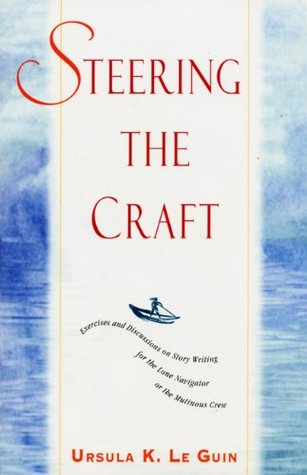Unlike last month’s resource, The Writer’s Notebook from Tin House, a relatively new acquisition, Le Guin’s book has been on my shelves for several years. It comes from Eighth Mountain Press (in Oregon, U.S.A.), so it had to be special ordered through my favourite local (at the time) indie bookshop, but it was definitely worth extra expense and a long wait.
I decided that I wanted a copy of my own immediately upon reading a segment in a writing magazine. It so struck me that, even now, I remember exactly where I was sitting (in “The Daily Grind”, a coffee shop on Dundas Street, in a table-for-two adjacent to the pretty Venetian-styled mural) when I came upon her description of Point of View and Voice.
This was maybe ten years ago and I was still freshly collecting books on writing; I had read a lot of the classics on the subject and many grammar handbooks and style manuals, but part of the appeal of Le Guin’s approach likely lay in her willingness to set aside some of those rules when the situation called for it.
Even now, I still warm to her tone, although I have since read plenty of writers who adhere to the “know the rules so you can break them” philosophy of writing. I like the anecdote with which she actually concludes this volume, citing a first sentence of one of her works: “The people in this book might be going to have lived a long, long time from now in Northern California.” That’s the kind of sentence that would make many editors squirm, and obviously, knowing the rules, she would have considered altering it but, ultimately, she kept it in and she’s still satisfied with her choice.
Le Guin kept this some-would-say-cumbersome sentence as the opening to Always Coming Home because it fit with her storyteller’s intentions: “It was the shortest way to say exactly what I meant.” It seems to fit with a philosophy in which each writer needs to consider the options available and then determine the “shortest way to get exactly where they and their work need to go”.
And, so, although Steering the Craft grew out of a writing workshop, it could easily be adapted for the use of a writer who worked more independently, that she actually intended the book be used by groups and by individuals working in solitude. I was living in a city in which I hadn’t met any other writers and I was just beginning to use the internet to connect with other writers, so it was a welcome reassurance in many ways.
As a younger writer, there was an immediate and strong appeal for me in Le Guin’s approach, but even now, returning to Steering the Craft, I find it a valuable resource.
Good stuff for writers.
Ursula K. Le Guin’s Steering the Craft: Exercises and Discussions on Story Writing for the Lone Navigator or the Mutinous Crew (Eighth Mountain Press, 1998)

